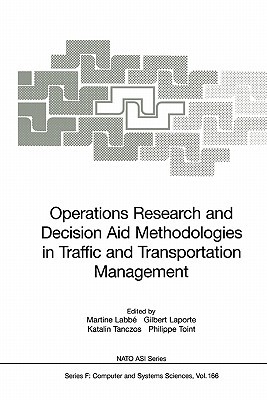| Operations Research and Decision Aid Methodologies in Traffic and Transportation Management Softcover Repri Edition Contributor(s): Labbe, Martine (Editor), Laporte, Gilbert (Editor), Tanczos, Katalin (Editor) |
|
 |
ISBN: 3642084281 ISBN-13: 9783642084287 Publisher: Springer OUR PRICE: $208.99 Product Type: Paperback - Other Formats Published: December 2010 |
| Additional Information |
| BISAC Categories: - Computers | Computer Science - Computers | Computer Simulation - Computers | Social Aspects |
| Dewey: 003.3 |
| Series: NATO Asi Subseries F: |
| Physical Information: 0.75" H x 6.14" W x 9.21" (1.12 lbs) 344 pages |
| Descriptions, Reviews, Etc. |
| Publisher Description: Every one relies on some kind of transportation system nearly every day. Go- ing to work, shopping, dropping children at school and many other cultural or social activities imply leaving home, and using some form of transportation, which we expect tobe eflicient and reliable. Of course, efliciency and reliabil- ity do not occur by chance, but require careful and often relatively complex planning by transportation system managers, both in the public and private sectors. It has long been recognized that mathematics, and, more specifically, op- erations research is an important tool of this planning process. However, the range of skills required to cover both fields, even partially, is very large, and the opportunities to gather people with this very diverse expertise are too few. The organization of the NATO Advanced Studies Institute on "Opera- tions Research and Decision Aid Methodologies in Traflic and Transportation Management" in March 1997 in Balatonf red, Hungary, was therefore more than welcome and the group of people that gathered for a very studious two weeks on the shores of the beautiful lake Balaton did really enjoy the truly multidisciplinary and high scientific level of the meeting. The purpose of the present volume is to report, in a chronological order, the various questions that were considered by the lecturers and the' students at the institute. After a general introduction to the topic, the first week focused on issues related to traflic modeling, mostly in an urban context. |